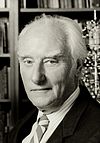 Francis Crick
Francis Crick


British molecular biologist, biophysicist, neuroscientist; co-discoverer of the structure of dna.
Born June 8th, 1916 in Northampton. [ref]
Died July 28th, 2004 at 88 years old in La Jolla (colorectal cancer). [ref]
Francis Crick, a Nobel Prize-winning biologist who was renowned for his discoveries regarding the structure of DNA, passed away on July 28th, 2004. Crick was 88 years old. Crick gained notoriety in 1953 when he and his colleagues James Watson and Maurice Wilkins established the helix-like structure of DNA, revolutionizing the world of biology. Over his career, Crick focused on genetic code, protein synthesis, molecular genetics, and the evolution of the human brain. This work culminated in several seminal publications, including Molecular Structure of Nucleic Acids: A Structure for Deoxyribose Nucleic Acid (1953) and DNA and the Genetic Code (1962). In addition to his award-winning research, Crick was also actively engaged in lecturing, writing, and teaching. He served as a visiting professor at the Salk Institute for Biological Studies from 1960 to 1976, and was a member of the faculty at The Salk Institute for Biological Studies in La Jolla, California for the rest of his career. Crick's effort was recognized with the Nobel Prize in Physiology or Medicine in 1962 and several other honors. He also received the Copley Medal in 2001 from the Royal Society of London. His influence in the field of biology is widely acknowledged, and he will be missed.
That’s what literature is. It’s the people who went before us, tapping out messages from the past, from beyond the grave, trying to tell us about life and death! Listen to them! Connie Willis